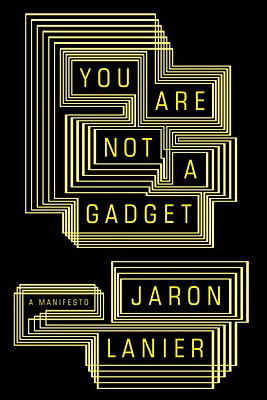Book Review: ‘You Are Not a Gadget’ by Jaron Lanier
The preface of this book is the most pessimistic and exaggerated one of probably all times.
“It’s early in the twenty-first century, and that means that these words will mostly be read by nonpersons – automatons or numb mobs composed of people who are no longer acting as a individuals. The words will be minced into atomized search-engine keywords within industrial cloud computing facilities located in remote, often secret locations around the world. They will be copied millions of times by algorithms designed to send an advertisement to some person somewhere who happens to resonate with some fragment of what I say. They will be scanned, rehashed, and misrepresented by crowds of quick and sloppy readers into wikis and automatically aggregated wireless text message streams. “
And what it is all about:
“Ultimately these words will contribute to the fortunes of those few who have been able to position themselves as lords of the computing cloud.”
It is clear after the first page, Jaron Lanier is not happy and he will tell his story with more geek-words than you could find on the interwebs.
Okay let us be serious now. Lanier warns us that humans are being degraded in the digital realm is and there is too little effort in trying to stop it. He fights against the contemporary commodified web, where the ‘hive’ mind works the land and the companies like Google and Facebook are the landlords. He fears that, just like Andrew Keen, of a hive culture that would dominate the web. But unlike Keen, he doesn’t fear the role of the amateurs, he fears that web users are no longer perceived as human beings:
“The ‘wisdom of crowds’ effect should be thought of as a tool. The value of a tool is its usefulness in accomplishing a task. The point should never be the glorification of the tool.”
He finds it awful that early software programmers locked us in by creating standards where we are now subjected to and these kinds of digital tools now defines us as computer processors. He strives for changes of software development before programmers design unchangeable rules that would define the behaviour of their users for the next generations. He gives a lot of examples, but a few really hit him hard. Probably because he is a musician, Lanier is particularly offended by the music standard MIDI, which after reading his book apparently is the greatest lock-in of all time after the ‘computer file’. Yes, the file. The greatest nightmare of the hippie dreams of Lanier, because the file has eliminated any other form of more beautiful ways to organizing information, which fits the human being much more than these fragmented chunks of data. Pessimistically, he says it is more likely that physicists replace the photon than the file will ever be something else.
Lanier dreams about the early days, where he could play in the digital garden, making pleasant small software programs and most of all, where the individual is praised. He is nostalgic for the early 1990’s where he probably was one of the landlords as he is the virtual father of virtual reality. Lanier really gives you the feeling that he is the father telling old stories about the early days where everything was better. What really is annoying is the fact he tries to authorize himself in the field by telling the reader, subtly but failed by doing so, on which projects he had worked on, with which people he had worked with, etc. Not sure if this is an act out of nervousness or to show the reader how much he knows.
By fighting for the individual above the hive mind, which in my opinion is a good thing, he criticizes all the big Internet companies by saying that they in some way assess the individual as merely data, or that the crowd is better than the person. His ideology is humanism or digital humanism and he tries to give the agency back to the individual, where is belongs.
But so what that we are not playing at the digital Eden? Most of the Facebook users don’t complain, Google is still being used by satisfied searchers. It seems to me that Lanier is striving for a goal that was born thirty years ago and is all but relevant today. Lanier is a digital immigrant who has mastered the language very well but forgets that the moral values have been changed. The reason why the digital natives of today are willing to fight against dominate companies is not because they are being perceived as the hive mind, that they are being locked-in by software or that the ‘human values’ are degraded. It often is about data, privacy and money and I got the feeling Lanier is being mad because, while he is one of the pioneers of the digital culture, he didn’t manage to position himself as a lord of the computing cloud. Romanticizing how things were so much better in the digital Eden is part of the anger management.
Full details:
Lanier, J. (2010). You Are Not a Gadget. Published by Alfred A. Knopf, New York.
ISBN 978-0-307-26964-5
